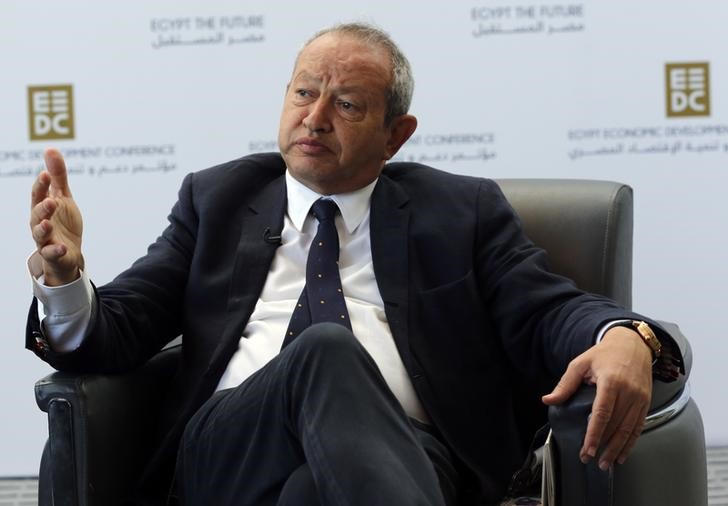By Shadi Bushra
CAIRO (Reuters) - One of Egypt's wealthiest businessmen, Naguib Sawiris, testified for the defense on Wednesday at the retrial of two Al-Jazeera television journalists, possibly boosting their standing in a case criticized from abroad.
Mohamed Fahmy and Baher Mohamed were sentenced last year to between 7 and 10 years in prison for aiding a "terrorist organization", a reference to the Islamist Muslim Brotherhood which was ousted from power by the army in mid-2013.
Their colleague Peter Greste, an Australian who was sentenced with them, was freed and deported earlier this year. All three denied the charges. In January, a court ordered a retrial, citing procedural flaws.
Fahmy, a naturalized Canadian who gave up his Egyptian citizenship, said outside the court on Wednesday that he and Sawiris, a member of Egypt's minority Coptic Christian community, had known each other "for a long time".
Fahmy, Greste and Mohamed covered Egyptian politics, including the rise to power of the Brotherhood after the Arab Spring uprising which left Egypt polarized.
In court, Sawiris, an outspoken critic of the Brotherhood, personally vouched for Fahmy, who spent over a year in prison before being freed in February.
"Mohamed Fahmy has no relation to the Muslim Brotherhood organization and he is not a Muslim Brother," Sawiris said.
The 60-year-old businessman recently told Reuters that Egypt should pay closer attention to improving human rights once the economy picks up, an unusual statement for someone in Egypt's top elite to make in public.
President Abdel Fattah al-Sisi's human rights record has come under scrutiny since he, as army chief, toppled Islamist president Mohamed Mursi in 2013 after mass protests against his rule. A crackdown launched thereafter resulted in hundreds killed and thousands of Muslim Brotherhood members put in jail.
Sisi has said that he wished the Al Jazeera journalists had been deported and not put on trial.
SAWIRIS TESTIFIES
Qatar-based Al Jazeera has described the charges against its journalists as absurd. In recent years, Egyptian state and private media have demonized the news channel, accusing it of supporting the Brotherhood, allegations it rejects.
Sawiris told the court that a distinction should be made between journalists and the network that employ them.
"The correspondents will go out and record the news and then send it to someone else who is responsible for putting that together into the news that is broadcast," he said.
"The organization, not the correspondent, is responsible for what is broadcast."
After the trial, Fahmy, showed journalists a temporary Canadian passport he said he had received from Canada's ambassador that day. Mohamed also had new Egyptian identification. Their papers had been seized when they were first arrested.
The Canadian embassy in Cairo declined to comment on Fahmy's case.
